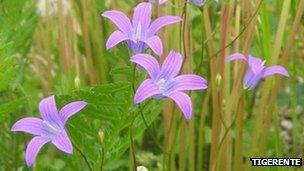National Botanic Garden of Wales logs plant DNA barcode
- Published

The spreading bellflower, campanula patula, is among the plants whose DNA is recorded
Wales has recorded the DNA of all its native flowering plants, which has potential to help conservation and develop new drugs to fight illnesses.
The National Botanic Garden of Wales says it is the first country in the world to create the database.
Wales has about 75% of UK flowering plants, and the database has 1,143 plants and conifers.
Barcodes are short DNA sequences and plants can be identified from pollen grains, seed pieces, or roots and wood.
Other plants introduced by humans will form the next phase of the three-year project.
The Barcode Wales project has been led by Dr Natasha de Vere, head of conservation and research from the National Botanic Garden in Carmarthenshire.
She said: "Wales is now in the unique position of being able to identify plant species from materials which in the past would have been incredibly difficult or impossible.
"Through the Barcode Wales project, we have created a powerful platform for a broad range of research from biodiversity conservation to human health."
The Welsh flora DNA barcodes are available on the <link> <caption>Barcode of Life Database</caption> <url href="http://www.gardenofwales.org.uk/science/barcode-wales/" platform="highweb"/> </link> (BOLD) for use by researchers throughout the world.
DNA barcoding may be able to help in the crisis facing pollinating insects such as bees, according to Dr de Vere.
Pollination role
She is working with PhD student Andrew Lucas from the Swansea Ecology Research Team (SERT) at Swansea University to investigate the role hoverflies play in pollination.
Research will find out where hoverflies go by DNA barcoding the pollen carried on their bodies.
It will tell researchers "how hoverflies move through the landscape and the importance of habitat quality," said Mr Lucas.
Partners in the Barcode Wales project include the National Museum Wales and Aberystwyth and Glamorgan universities, as well as the Botanical Society of the British Isles, and High Performance Computing (HPC) Wales.
- Published24 February 2011